VFC-12 "FIGHTING OMARS" BRIEFING ROOM, 0630L. "Attention! At ease. Good morning, gentlemen! My name is LT CDR Buford "Viper" Bentley and welcome to the Fighter Weapons School, or as we like to call it here...TOP GUN. This morning, you'll be flying your first advanced air combat maneuvering hop against our adversary simulator, the F-20N "Tigershark". The F-20 is an outstanding adversary simulator, fast, small, hard to see and it turns like nothing else. Get in a turning fight with an F-20...or a MiG-21 or a MiG-29 and it's over! Your F-14s, while outstanding interceptors, do not match an F-20's, or the Soviets', turn radius, so attempt to engage using your advantages: SA, speed and BVR missile shots. Questions? Step in 15, dismissed!"

Imagine if, in the 1980s, the USN and USAF had bought the Northrop F-20 "Tigershark" as their premier adversary fighter, a jet that brought true 4th Gen capabilities into the role? Well, imagine no more. The F-20 was arguably one of the finest fighters never fielded. Northrop upgraded it's F-5E Tiger with a single General Electric F404-GE-100 engine, giving it slightly better than a 1:1 thrust to weight ratio, Mach 2 speed at altitude, SUPERCRUISE, advanced radar and systems, plus a new cockpit with a bigger, easier to see out of canopy. But the F-20, offered for sale to the U.S., Taiwan, South Korea, Oman and many others, and marketed by none other than Brig Gen Charles "Chuck" Yeager, was put aside in favor of the F-16 as those countries wanted to fly what the USAF was flying. A great jet became a footnote in history. But here it is now, just like the RL jet, along with its accurately scheduled afterburner nozzle, AUTO trailing/leading edge flap scheduling, Flight Path Vector (FPV), working G-meter, sequenced landing gear doors, AIM-9Ls, and more....all in a 1:1 scale with accurate weights, fuel, wing loading, performance, turn capability, done up in the livery of VFC-12, the "Fighting Omars", one of the USN's TOP GUN units from the 1980s. I've compromised very little here to bring this one to life. It's my finest work to date, I hope you all enjoy!
WARNING: I WAS AN INSTRUCTOR PILOT IN THE T-38 AND I BROUGHT
ALL MY EXPERIENCE TO ENSURE THIS F-5 DERIVITIVE FLIES LIKE THE REAL THING, AT LEAST AS CLOSE AS SP DYNAMICS ALLOWS. IT WILL DEPART CONTROLLED FLIGHT IF YOU MANHANDLE IT, IT WILL STALL ON FINAL IF YOU GET TOO SLOW, IT WILL THROW ITS DROPTANK OFF IF YOU SEVERELY OVER-G THE JET, BUT ITS A BLAST TO FLY, JUST LIKE THE REAL THING.
READ AND HEED THE FLIGHT MANUAL!
Credits:
BogdanX - This would have been impossible to complete without his help, he completely revamped my flight model and gave all sorts advice and criticism.
SnoWFLakE0s - Funky Tree genius...take a look at the formulas on this one, insanely long statements which accurately capture the F-20's coolest features.
FairFireFight - He built the gorgeous AIM-9Ls, which like the real things, do occassionally miss.
Leehopard - FPV concept brought to life.
EngineerOtaku - Thanks for the MiG!
To all my buds on the SPMC for your advice, criticism and encouragement, thanks!
NAVAIR F-20N FLIGHT MANUAL
SECTION 1. Description.
SP CONTROLS:

Fig. 1, F-20 Callouts.
AG1 - Position and Landing Lights (landing lights extend with LG)
AG2 - Nose Gear Hike (Activate prior to takeoff to reduce takeoff distance)
AG3 - Droptank Jettison (If not equipped with droptank, activate for increased speedbrake extension)
AG4 - MASTER ARM (Arms AIM-9Ls)
AG5 - Drag Chute
AG6 - Tailhook
AG7 - [Reserved]
AG8 - [Reserved]
Landing Gear - Landing gear and flaps (w/flaps in AUTO).
VTOL - Roll trim (see Section 3-1, Tactics, Techniques and Procedures, below).
Trim - Pitch trim.
Brake - Speedbrakes/wheel brakes.
Throttle >98% RPM - Afterburner.

Fig. 2, HUD Symbology.
NOTE: TRIM IS YOUR FRIEND AND COMPENSATES FOR CHANGES IN AIRCRAFT SPEED, JUST AS IT DOES IRL...YOU SHOULD BE USING TRIM AS MUCH AS YOU USE STICK INPUT TO ADJUST AIRCRAFT PITCH.
WARNING: THIS IS A SYMMETRIC WING AND FLIES AS IT DOES IRL. FASTEST ROLL RATES ARE ACHIEVED BY UNLOADING BACKSTICK PRESSURE, INPUTTING AILERON ROLL, THEN RELOADING BACKSTICK PRESSURE ONCE AILERONS NEUTRALIZED. USING THE AILERON TO ROLL WHILE HOLDING HIGH AOA/BACKSTICK PRESSURE IS MARGINALLY EFFECTIVE AND MAY RESULT IN AIRCRAFT DEPARTING CONTROLLED FLIGHT. UTILIZING THE RUDDER DURING HIGH AOA FLIGHT IS ALSO AN APPROVED TECHNIQUE FOR ROLLING THE AIRCRAFT
(Sorry, keyboard users, but this is as it is IRL and I wasn't going to decrease the turn rate to accommodate as long as a proper pilot technique could compensate).
SECTION 2. Normal Procedures.
TAKEOFF CHECKLIST:
- Set aircraft lighting, as appropriate (AG1).
- Hike nose gear (AG2).
- Verify (with crewchief) speedbrake store compensation selected (If no droptank or stores on centerline, activate AG3).
- Set takeoff trim (front edge of horizontal slab even with index).
- Takeoff Power, 98% (MIL Power) or 100% (MAX Power), as appropriate.
- Rotate at 145 KIAS to liftoff at 162 KIAS.
- Raise gear immediately after airborne, verify flaps follow.
- Trim as required.
- Dehike nosegear (deactivate AG2).
NOTE: Nosewheel steering limit 65 KIAS. Use small, short rudder inputs during takeoff roll to prevent a pilot induced oscillation and runway excursion.
FENCE IN CHECK (PRE COMBAT CHECKLIST):
- Turn off aircraft lighting (AG1).
- Select AIR-TO-AIR or AIR-TO-GROUND mode (as appropriate).
- Select MASTER ARM to arm weapons (AG4), if equipped.
- Verify flaps in AUTO.
NOTE: Best Rate of Turn is a achieved above 450 KIAS, MAX power.
NOTE: Aircraft controls will become less effective when exceeding Mach .98 (approximately 520 KIAS at 10,000' MSL) and entering the transonic zone. For best turn rate in engagements, keep aircraft speed between 450 - 520 KIAS.
NOTE: Monitor leading edge and trailing edge flaps For extension and retraction during maneuvering.
LOAD FACTOR LIMITATIONS
SYMMETRICAL FLIGHT
Load Factor (Gs)
- 3.0 to +9.5
WITH CENTERLINE 150 GAL TANK INSTALLED
Load Factor (Gs)
-3.0 to +6.0
NOTE: When carriage of single AIM-9 is required on a wingtip station, use roll trim, as required, to compensate for aircraft roll.
FENCE OUT CHECK:
- Turn On Aircraft Lighting, As Appropriate (AG1).
- Deselect MASTER ARM/safe weapons (AG4).
- Deselect AIR-TO-AIR or AIR-TO-GROUND Mode.
LANDING CHECKLIST:
- Check nosegear dehiked (Deactivate AG2).
- Enter final approach approximately 5 NM at 260 KIAS or Less.
- Below 260 KIAS, lower landing gear (verify flaps extend FULL).
- TRIM AS APPROPRIATE...put Flight Path Vector on or near the NEAR end of the runway.
- Minimum of 155 KIAS on Final (Approximately 25% Power).
- Over underrun, power to idle and flare to land...put FPV at FAR end of runway in flare.
- Drag chute (AG5), if required.
- Apply brakes to stop.

Fig. 3, Pattern Diagram.
Happy Hunting and Fly Safe!

Specifications
Spotlights
- This craft has been featured
- Feanor 5.1 years ago
- Dimkal 5.1 years ago
- GrizzlitnCFSP 5.1 years ago
- DeathStalker627 3.9 years ago
- EternalDarkness 5.1 years ago
- BaconAircraft 5.1 years ago
- FairFireFlight 5.1 years ago
- Kevinairlines 3.9 years ago
- CRJ900Pilot 5.1 years ago
- Hedero 5.1 years ago
- asteroidbook345 4.3 years ago
- Dllama4 5.1 years ago
- CoolPeach 5.1 years ago
- Freerider2142 5.1 years ago
- RamboJutter 5.1 years ago
- Tang0five 5.1 years ago
- Thecatbaron 5.1 years ago
- MOPCKOEDNISHE 4.2 years ago
- Zott 5.1 years ago
- AdlerSteiner 5.1 years ago
General Characteristics
- Successors 6 airplane(s) +49 bonus
- Created On Windows
- Wingspan 28.4ft (8.6m)
- Length 47.5ft (14.5m)
- Height 15.3ft (4.7m)
- Empty Weight 13,935lbs (6,320kg)
- Loaded Weight 19,389lbs (8,795kg)
Performance
- Power/Weight Ratio 1.274
- Wing Loading 62.7lbs/ft2 (305.9kg/m2)
- Wing Area 309.5ft2 (28.8m2)
- Drag Points 2060
Parts
- Number of Parts 729
- Control Surfaces 3
- Performance Cost 2,945

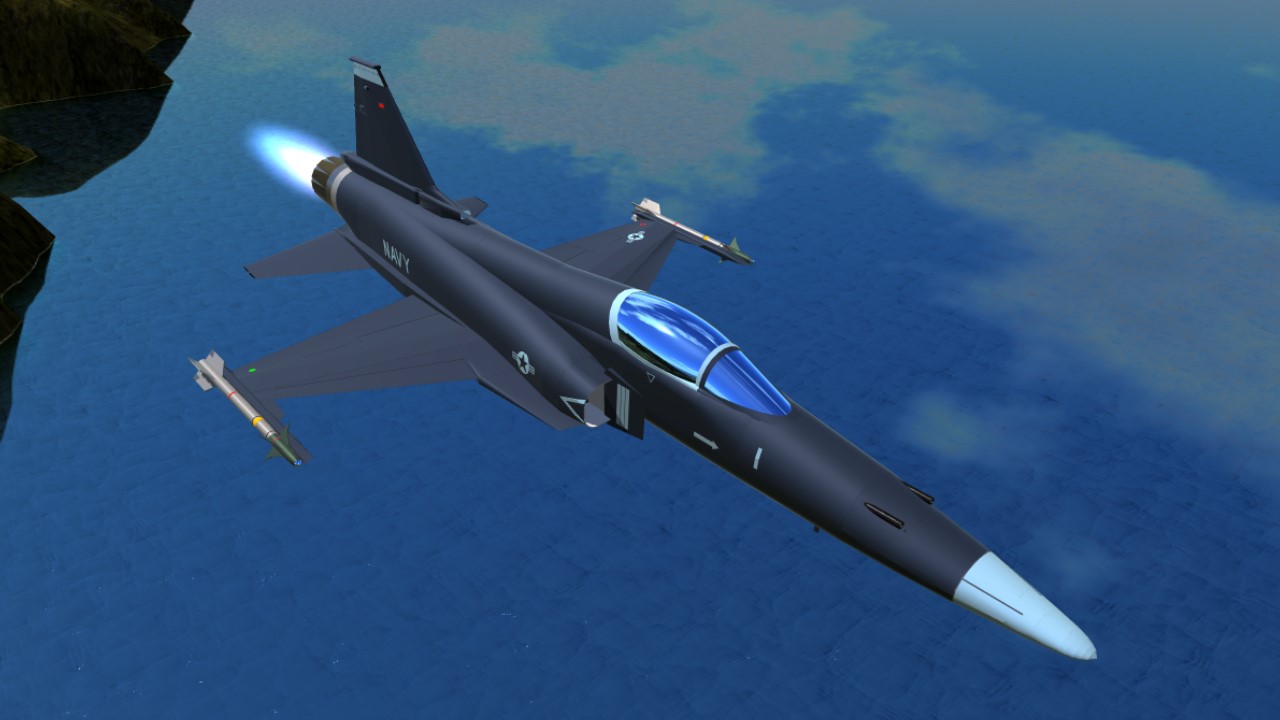
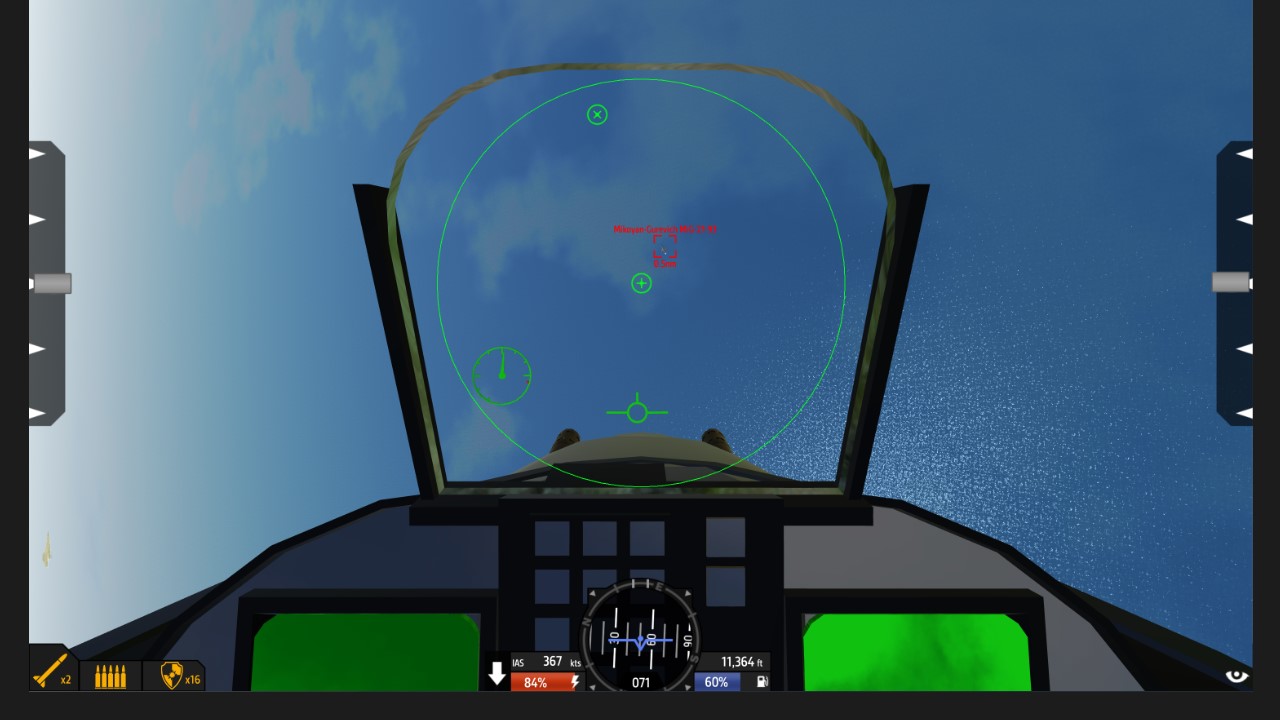
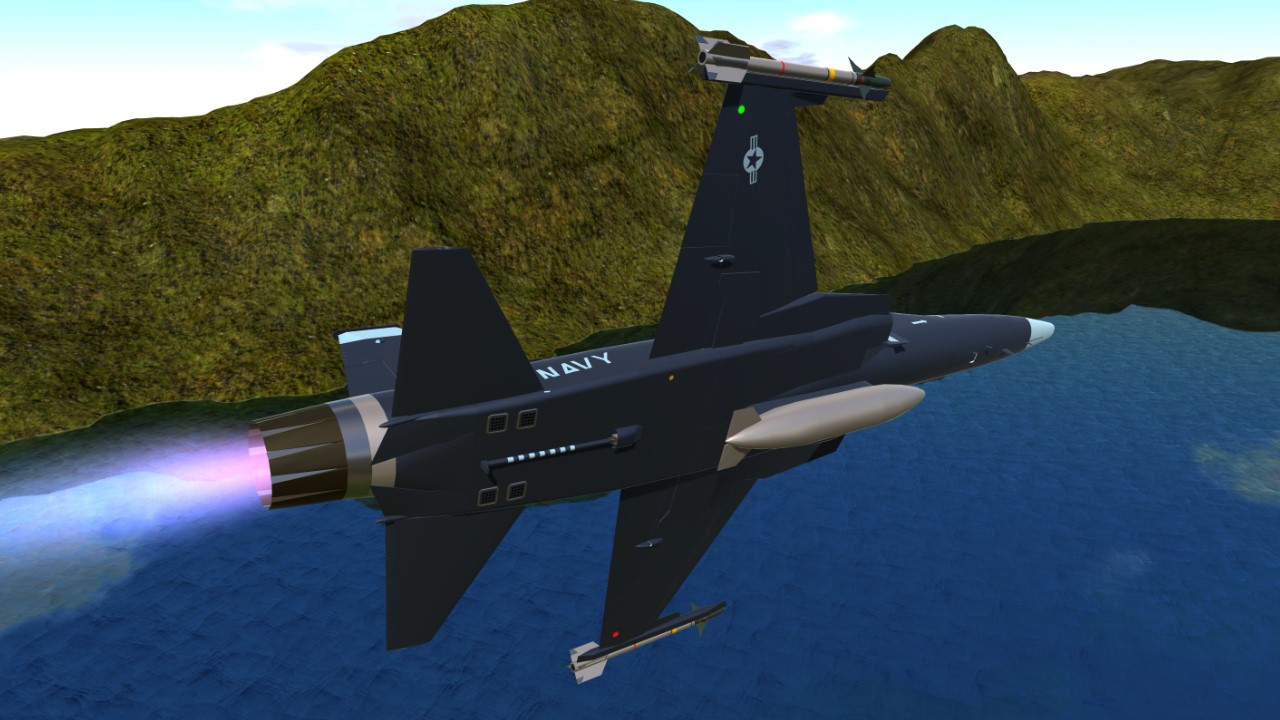

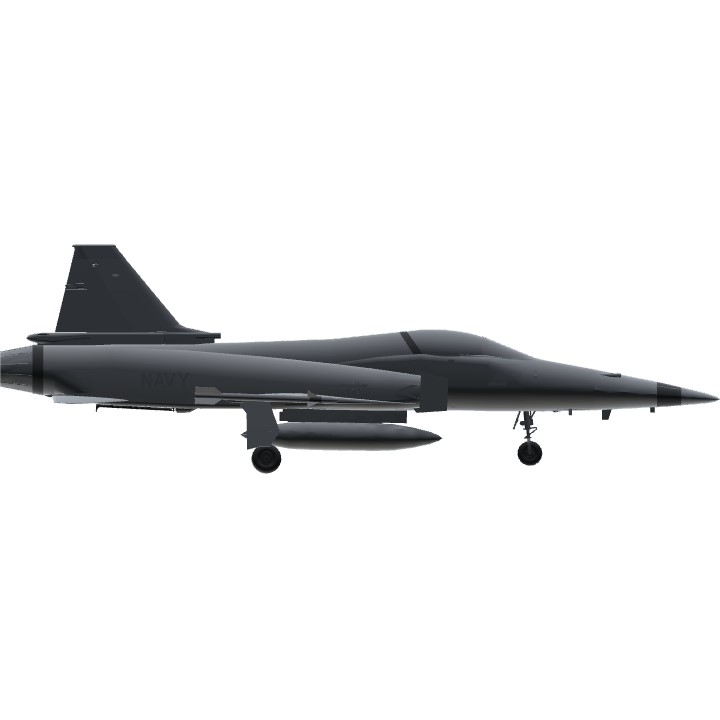
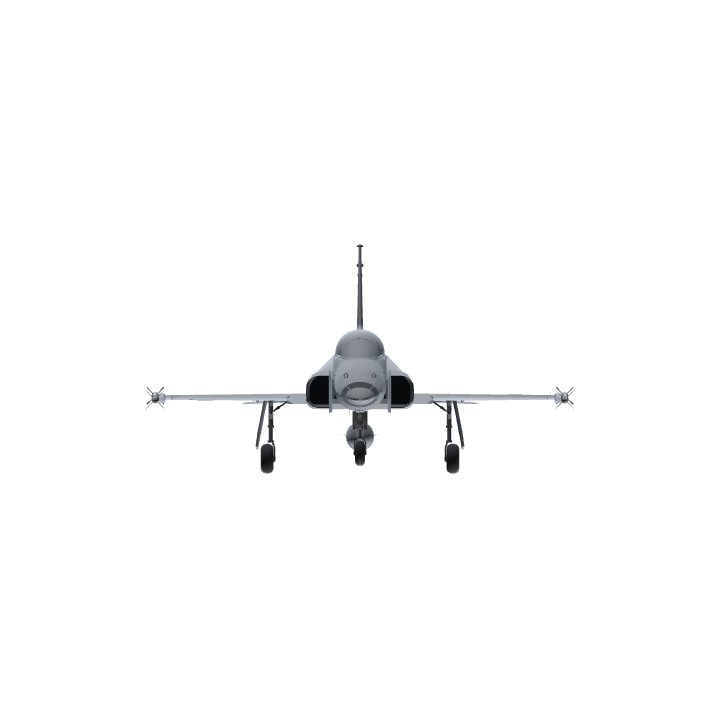
@ChiChiWerx i remember they had this in Microsoft flight sim 4.0 or earlier.
one of my favorite planes back then
a joy to fly on the older flight sim
too bad we werent able to code anything fbw in those older flight sims.
otherwise i probably couldve made my fbw'ed x-29 at age 15
Me:Going bald on readinh such a long Description.
My absolute favourite! Really good plane and it is also my favourite fighter aircraft model. Thanks
@ChiChiWerx Thanks!
@MAHADI sure thing. There's probably a better one out there because my AB kicks in above 98% (at 99%). I couldn't figure out a way to get it to only kick in at 100%, but I know others have. But, feel free to use.
can I use your FT codes in the exhaust nozzle on an F-20 I have been working on?
thats aviation :) @Graingy
The F-20 was the best F-5 that never was...
@AsteroidAsteroidTheBook Ah, okie
@EngineerOtaku Hey you just found out what my home state is
@AsteroidAsteroidTheBook If you saw it in a museum I'm assuming you went to Cali at some point because the ONLY remaining F-20 is there in a science center. Unless there's mockups and full scale replicas dotted in various museums or something
I saw one of these in a museum and wanted to make it but I feel like if I had it wouldn't have been nearly as accurate as this is
@rexrexThezion here, it’s a combination of the relatively high wing loading and the symmetric airfoil. You can emulate the idea, but it’s tricky to do it consistently in SP. In this case, it’s just the flight dynamics, in other cases I’ve wanted to replicate the effect, I’ve had to resort to mounting the two wings on rotators which act counter aileron input when exceeding a certain AoA.
how did you get this effect that happens when rolling and pitching at the same time?
like the aircraft rolls inverted and loses control?
Also, with that experience of yours, I just have to ask: Will you do a proper T-38 at some point? That is sorely missed here so far!
Never knew the F-20 was supercruise-capable. This is some seriously brilliant work. Great flight model und sleek looks. I just love everything F-5(ish)!
Oh wow. I didn't realize the f-20 was that manueverable. Not sure if the same can be said for the t-38 (which is what I'm making) or not. But so you flew f-5s? What did you serve in the army?@ChiChiWerx
@Hedero that’s actually not that surprising, the F-5 and MiG-21 were very similar performers, which is why the U.S. uses the F-5 as an adversary simulator to this day. The F-20 was a better performer, thanks to the much better engine with more thrust, but it wasn’t light years ahead of the MiG in terms of sheer performance numbers. But the weapons systems, cockpit displays and pilot integration was better than the MiG. That aspect is much more difficult to capture in SP, but it does make sense you were able to tweak the flying performance. It’s also gratifying in that I was able to at least land in the same performance ballpark as the RL jet.
Lol I was messing around with your plane and made it fly like a mig-21
waw
awesome work! very scale, thnks
Your builds and understanding of aircraft, physics and realism are insane, im definitely going to try to learn some methods you use in SP thanks for sharing them
Alas, @TOXICJohnny, like the F-5N from which it’s derived and with which it shares its mission of adversary training, it’s not a shipboard fighter. I didn’t include a catapult attachment, though I am sure you could add one quite easily.
anybody Having issues with the catapult?
('<>')